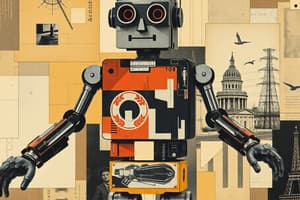Podcast
Questions and Answers
Which category of robots operates in environments that are not suitable for humans?
Which category of robots operates in environments that are not suitable for humans?
- Simple level robots
- Humanoid robots
- Teleoperated robots
- Autonomous robots (correct)
What type of robot works alongside humans to enhance their capabilities?
What type of robot works alongside humans to enhance their capabilities?
- Augmenting robots (correct)
- Preprogrammed robots
- Logistics robots
- Complex level robots
In which sector are robots NOT traditionally used?
In which sector are robots NOT traditionally used?
- Manufacturing
- Travel
- Fashion design (correct)
- Healthcare
Which type of robot operates based on pre-defined instructions?
Which type of robot operates based on pre-defined instructions?
What best describes a complex level robot?
What best describes a complex level robot?
What is defined as a machine capable of carrying out complex actions automatically?
What is defined as a machine capable of carrying out complex actions automatically?
Which of the following is NOT a reason why we need robots?
Which of the following is NOT a reason why we need robots?
Who coined the word 'robot'?
Who coined the word 'robot'?
What technology did Henry Ford install in 1913 that greatly improved production?
What technology did Henry Ford install in 1913 that greatly improved production?
Which of the following correctly describes one of the categories of robots?
Which of the following correctly describes one of the categories of robots?
What type of tasks are robots particularly good at performing?
What type of tasks are robots particularly good at performing?
Which historical figure created plans for a humanoid robot around 1495?
Which historical figure created plans for a humanoid robot around 1495?
What is one reason robots are often cheaper than human workers?
What is one reason robots are often cheaper than human workers?
Which robot was known for defeating world chess champion Garry Kasparov?
Which robot was known for defeating world chess champion Garry Kasparov?
What type of robot is ASIMO considered to be?
What type of robot is ASIMO considered to be?
Which type of robot operates independently without human supervision?
Which type of robot operates independently without human supervision?
Which feature distinguishes middle level robots from simple level robots?
Which feature distinguishes middle level robots from simple level robots?
What is a common characteristic of all robots?
What is a common characteristic of all robots?
What is the primary function of pre-programmed robots?
What is the primary function of pre-programmed robots?
What is the main purpose of teleoperated robots?
What is the main purpose of teleoperated robots?
Which robot is known for its ability to learn and communicate with its owner?
Which robot is known for its ability to learn and communicate with its owner?
Which of the following best describes the primary function of augmenting robots?
Which of the following best describes the primary function of augmenting robots?
Which industry is noted as the first and oldest user of robots?
Which industry is noted as the first and oldest user of robots?
In which application do robots assist with repetitive household tasks?
In which application do robots assist with repetitive household tasks?
What is a significant advantage of using robots in healthcare?
What is a significant advantage of using robots in healthcare?
What role do robots play in the logistics industry?
What role do robots play in the logistics industry?
Which of the following descriptions is NOT a use of robots?
Which of the following descriptions is NOT a use of robots?
What is a common misconception about robots compared to human workers?
What is a common misconception about robots compared to human workers?
Karel Capek is known for coining the term 'robot.' In what context did he introduce it?
Karel Capek is known for coining the term 'robot.' In what context did he introduce it?
What is the original meaning of the word 'robot'?
What is the original meaning of the word 'robot'?
What was the first true robot toy, and in which country was it produced?
What was the first true robot toy, and in which country was it produced?
Who wrote the short story 'Liar!' that describes the Three Laws of Robotics?
Who wrote the short story 'Liar!' that describes the Three Laws of Robotics?
What is the primary purpose of the Turing Test?
What is the primary purpose of the Turing Test?
What significant contribution did George Devol and Joe Engleberger make in 1954?
What significant contribution did George Devol and Joe Engleberger make in 1954?
Which event marked the beginning of the space race?
Which event marked the beginning of the space race?
In what year did the U.S. land Neil Armstrong on the moon?
In what year did the U.S. land Neil Armstrong on the moon?
What notable project did Honda begin in 1994?
What notable project did Honda begin in 1994?
Study Notes
Learning Objectives
- Understand Asimov’s Three Laws of Robotics
- Identify three categories and five general types of robots
- Discuss reasons for robot utilization
- Explore practical applications of robots
Definition of Robots
- Machines capable of performing complex tasks automatically, often programmable by a computer.
- Autonomous machines can sense their environment, compute decisions, and act within it.
- Robotics is an interdisciplinary field focused on designing and using mechanical robots.
Importance of Robots
- Robots can work tirelessly, unlike humans with limited energy.
- They're efficient in performing repetitive tasks with precision and accuracy.
- Safe operation in hazardous environments protects human health.
- Economic advantage as robots are less costly than human workers over time, needing only maintenance.
Historical Milestones in Robotics
- 320 B.C: Aristotle's vision of autonomous tools.
- 1495: Leonardo da Vinci's sketches for a humanoid robot.
- 1920: Karel Capek coins the term "robot" which means "compulsory labor."
- 1941: Isaac Asimov introduces the Three Laws of Robotics in his fiction.
Asimov's Three Laws of Robotics
- A robot should not harm a human or allow harm through inaction.
- A robot must follow orders given by humans except where it conflicts with the first law.
- A robot must preserve its own existence unless it conflicts with the first two laws.
Classification of Robots
- Simple Level: Automatic machines without complex circuits, limited to enhancing human potential.
- Middle Level: Programmable robots that can perform tasks but cannot be reprogrammed.
- Complex Level: Highly advanced robots capable of multi-tasking and reprogramming.
Five General Types of Robots
- Pre-Programmed Robots: Operate in controlled environments, handling simple repetitive tasks.
- Humanoid Robots: Mimic human appearance and behaviors.
- Autonomous Robots: Function independently without human supervision in open environments.
- Teleoperated Robots: Controlled remotely by humans, used in extreme conditions.
- Augmenting Robots: Enhance or replace human abilities.
Applications of Robots
- Manufacturing: Original and primary user of robotics.
- Logistics: Essential for shipping and quality control in online retail.
- Home: Assist with household chores and schedule management.
- Travel: Enable autonomous vehicles for improved transportation.
- Healthcare: Execute operations with high precision and safety.
- Security and Military: Utilized in various operations for law enforcement and exploration.
- Space Exploration: Aid in studying celestial bodies and conducting experiments in space.
- Agriculture: Automation in crop harvesting and related tasks.
- Entertainment: Engage users through interactive learning and companionship.
- Hobby and Competition: Involve participants in robotics contests across various tasks and challenges.
Key Takeaways
- The term "robot" reflects the concept of compulsory labor as introduced by Karel Capek.
- Robots provide an array of benefits such as cost-efficiency, precision, and operational safety.
- Understanding the categories and types of robots is crucial for the future of technology and innovation.
Studying That Suits You
Use AI to generate personalized quizzes and flashcards to suit your learning preferences.
Related Documents
Description
This quiz covers the fundamentals of robotics, focusing on Asimov’s Three Laws of Robotics, categories of robots, types of robots, and their practical applications. Test your understanding of the history and significance of robots in our society. Dive into the fascinating world of robotics and explore why these machines are crucial in various fields.




